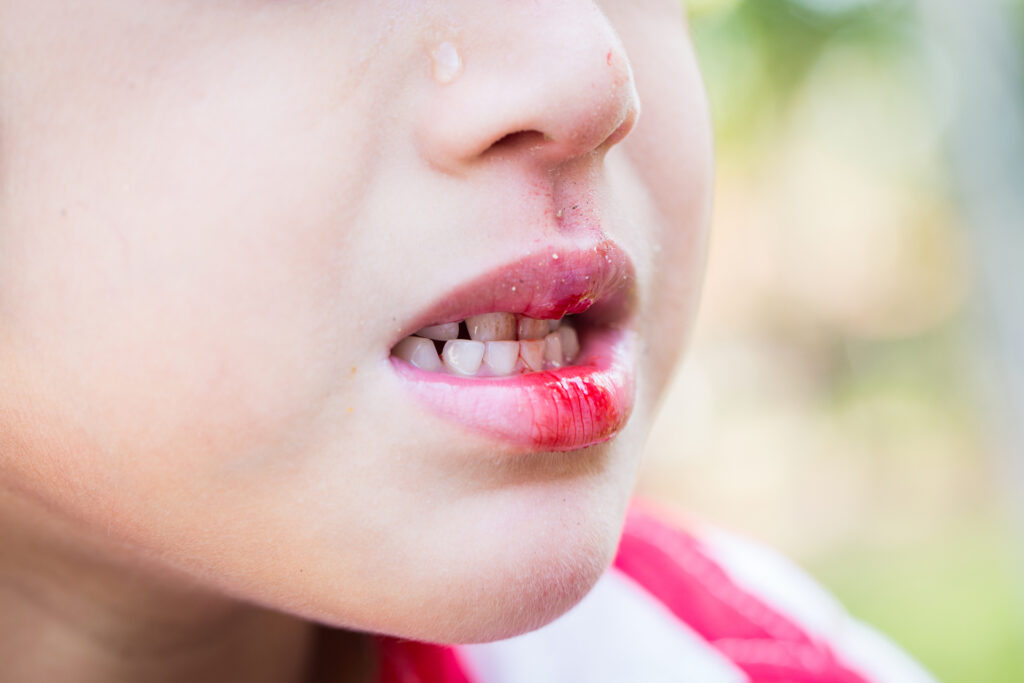What Is Tooth Subluxation?

Your toddler falls and hits her mouth. When you pick her up, you notice that her gums are bleeding and one of her front teeth feels slightly loose. What should you do?
First, stay calm. Second, call a pediatric dentist.
Your toddler might have a subluxated tooth, a dental injury that should be examined promptly by an experienced dentist but that often heals up without any invasive treatments. Read on to find out more!
What Is Tooth Subluxation in Children?
Dental injuries can be categorized as either injuries to the teeth themselves (e.g., a chipped tooth) or injuries to the tissues that support the teeth, such as the gums.
When the tissues supporting a tooth are damaged in a way such that the tooth becomes loose, but does not move out of its proper position, it is referred to as tooth subluxation. (In contrast, tooth luxation occurs when a tooth has both become loose and moved out of its normal position.) Tooth subluxation is often, but not always, accompanied by bleeding in the gum tissue surrounding the loose tooth.
Tooth subluxation is most commonly seen in children’s front teeth and is often the result of trauma, such as a fall.
What Should I Do If My Child Hits His or Her Front Teeth?
If your child hits his or her front teeth – or any teeth, for that matter – immediately inspect your child’s mouth for signs of injury (such as pain, bleeding gums, loose teeth (including subluxated teeth), or broken teeth). In the event of a dental injury, contact your child’s pediatric dentist as soon as you can.
How Do You Treat A Subluxated Tooth in Kids?
In most cases, tooth subluxation will heal on its own without treatment. However, it is still important to visit your child’s pediatric dentist as soon as possible after the injury. It is not uncommon for other dental injuries to accompany a tooth subluxation, and these injuries may not be immediately noticeable to the untrained eye.
Your child’s dentist will examine the affected area and take dental X-rays to help determine whether any other damage – such as bone damage, damage to the tooth’s root, or (in the case of a subluxated primary tooth) damage to the replacement permanent tooth – has occurred. Damage beyond mere tooth subluxation may require treatment.
If your child’s dentist does not detect any additional damage, the dentist will typically recommend simply monitoring the affected tooth. This usually requires bringing your child in for several follow-up appointments so that your child’s dentist can monitor the tooth for signs of infection or abscess, damage to the dental pulp, and problems with the development of the tooth (or, in the case of a subluxated primary tooth, damage to the replacement permanent tooth).
Your child’s dentist will also discuss with you how best to care for the subluxated tooth in order to promote healing and avoid infection. The exact recommendations will depend on a number of factors, but generally speaking, it is important to keep the area around the injury as clean as possible and to avoid using the subluxated tooth to bite into hard foods (like pretzels) until the injury has healed.
Treatment for Pediatric Dental Injuries in Hurst, Texas
If you think your child might have a subluxated tooth, call Hurst Pediatric Dentistry at 817-510-6400. Hurst Pediatric Dentistry’s Dr. Lin is a board-certified pediatric dentist who has extensive experience with pediatric dental trauma cases, including subluxated teeth.
Hurst Pediatric Dentistry is located in Hurst, TX, and treats patients from Hurst and the surrounding area, including Euless, Bedford, Colleyville, North Richland Hills, Keller and Fort Worth.
This article is intended to provide general information about oral health topics. It should not be used to diagnose or treat any medical condition or as a substitute for the advice of a healthcare professional who is fully aware of and familiar with the specifics of your case. Always seek the advice of your dentist or other qualified healthcare provider with regard to any questions you may have relating to a medical condition or treatment.
MEDICALLY REVIEWED BY:
Dr. Jin Lin

Dr. Jin Lin is a board-certified pediatric dentist with a passion for helping children achieve healthier, more beautiful smiles. He earned his Bachelor of Science degree from Cornell University and his Doctor of Dental Medicine (D.M.D.) degree from the Harvard School of Dental Medicine. After graduating cum laude from dental school, he completed his post-doctoral pediatric dentistry training at Boston Children’s Hospital and the Harvard School of Dental Medicine, where he served as chief resident and worked with children with a wide variety of special medical and dental needs, including children with rare syndromes.

